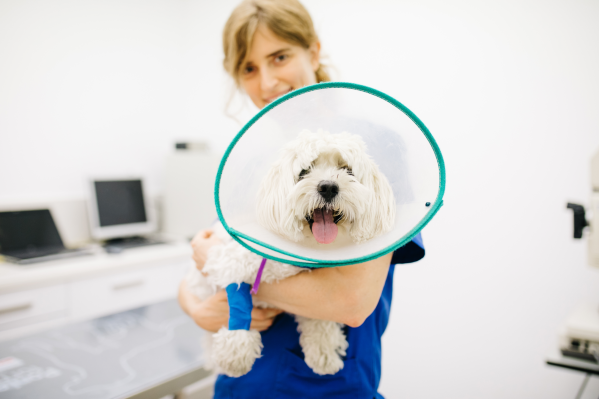Ringworm is a common, contagious fungal infection that affects pets as well as humans. The condition isn’t a fatal one, but it’s certainly an uncomfortable condition for your pup—and since it's so contagious, it can also spread to other animals and humans.
Read on to learn everything about ringworm on your dog, including what causes it, how to treat it, and how to prevent your pup from getting it in the first place.
What causes ringworm and how do dogs get it?
Ringworm (dermatophytosis is the scientific term), is a fungal infection that impacts the nails, hair follicles, and top layer of the skin on pups. Dogs can get infected with ringworm through direct skin contact with the fungus, which can come from getting too close to an already-infected animal or through objects like blankets and brushes, and even through the soil.
What are the symptoms of ringworm?
“The most common symptoms are usually due to a particular type of ringworm called Microsporum Canis,” explains Dr. Yui Shapard. “This causes patchy ring-shaped baldness, broken hair follicles, and scaly-looking skin.”
Ringworm’s signature circular shape, however, doesn’t show up for every ringworm case.
“Sometimes, the bald spots can look more spread out, the skin could look reddened and/or crusty, and lesions could be localized or all over the body, including the head,” says Dr. Shapard. “They are also not always itchy, and some dogs may appear completely unbothered by their lesions.”
Another symptom of ringworm can be rough, brittle claws. If your pup has any of these signs, there’s a chance they might have an infection.
How do you treat ringworm in dogs?
The good news about ringworm is that it isn’t fatal. It also will likely clear up on its own after a few weeks. Because it’s contagious, however, veterinarians recommend treating the condition to stop it from spreading. Your pup will also thank you for clearing out the infection as quickly as possible so they can get back to being comfortable and happy.
Treating ringworm involves treating your dog directly and also making your dog’s environment (a.k.a. your home and anywhere your pup spends a lot of time) ringworm-free.
Your veterinarian will likely prescribe a topical anti-fungal cream for your dog’s lesions or a lime sulfur dip, both of which will kill any ringworm spores on your dog’s skin and hair. Your vet will also likely prescribe oral anti-fungal medication to help your dog recover quickly.
With your dog’s symptoms taken care of, the next step is to make sure your home is ringworm-free as well.
“You can effectively clean the environment by removing hair follicles through vacuuming or using electrostatic disposable products like Swiffer pads,” suggests Dr. Yui Shapard.
For hard surfaces, you can kill any spores with a diluted bleach solution, and any blankets or towels or other soft fabrics your infected pup has been in contact with should go into the laundry. You should also wash your dog’s food and water bowls, just to be safe.
“This all sounds like a lot of work,” Dr. Shapard admits. “So when your dog is diagnosed with ringworm, the best way to limit the spread is to house your dog in one part of the home, if possible, and avoid placing them in a room that is carpeted. Twice weekly cleaning during the treatment should be enough to make sure the environment is clear of infective spores.”
Can you prevent ringworm in dogs?
There’s no way to 100% eliminate the chance that your dog will get ringworm. The major thing you can do to reduce the likelihood of an infection, however, is to keep your pup away from other animals that have ringworm-like lesions.
Many pet parents often realize their pup has ringworm when they first bring them into their home. To prevent this from happening or to catch the ringworm quickly, you should have your new furry friend physically examined by your veterinarian to make sure they are healthy and have no signs of lesions.
And of course, if you have any specific questions about your pup—ringworm or otherwise—the experts at Pawp are available 24/7 to help you with your dog’s needs.
